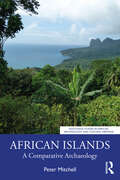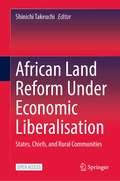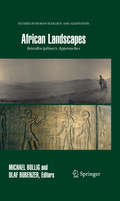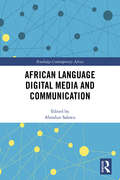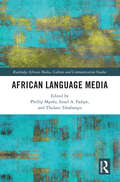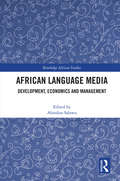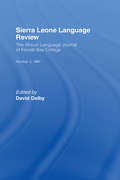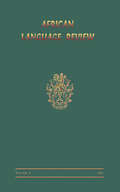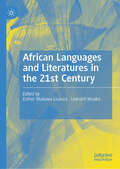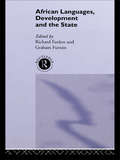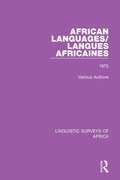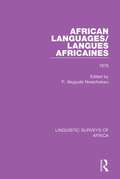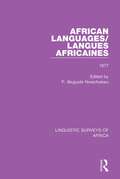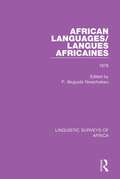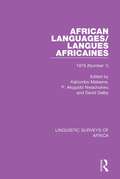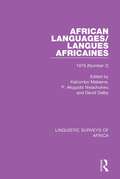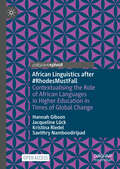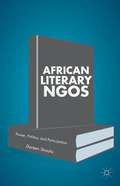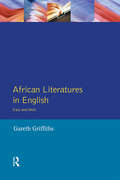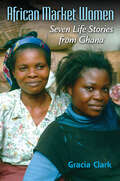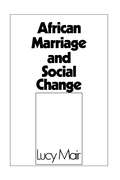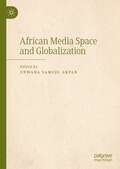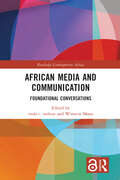- Table View
- List View
African Islands: A Comparative Archaeology (Routledge Studies in African Archaeology and Cultural Heritage)
by Peter MitchellAfrican Islands provides the first geographically and chronologically comprehensive overview of the archaeology of African islands. This book draws archaeologically informed histories of African islands into a single synthesis, focused on multiple issues of common interest, among them human impacts on previously uninhabited ecologies, the role of islands in the growth of long-distance maritime trade networks, and the functioning of plantation economies based on the exploitation of unfree labour. Addressing and repairing the longstanding neglect of Africa in general studies of island colonization, settlement, and connectivity, it makes a distinctively African contribution to studies of island archaeology. The availability of this much-needed synthesis also opens up a better understanding of the significance of African islands in the continent's past as a whole. After contextualizing chapters on island archaeology as a field and an introduction to the variety of Africa’s islands and the archaeological research undertaken on them, the book focuses on four themes: arriving, altering, being, and colonizing and resisting. An interdisciplinary approach is taken to these themes, drawing on a broad range of evidence that goes beyond material remains to include genetics, comparative studies of the languages, textual evidence and oral histories, island ecologies, and more. African Islands provides an up-to-date synthesis and account of all aspects of archaeological research on Africa’s islands for students and academics alike.
African Land Reform Under Economic Liberalisation: States, Chiefs, and Rural Communities
by Shinichi TakeuchiThis open access book offers unique in-depth, comprehensive, and comparative analyses of the motivations, context, and outcomes of recent land reforms in Africa. Whereas a considerable number of land reforms have been carried out by African governments since the 1990s, no systematic analysis on their meaning has so far been conducted. In the age of land reform, Africa has seen drastic rural changes. Analysing the relationship between those reforms and change, the chapters in this book reveal not only their socio-economic outcomes, such as accelerated marketisation of land, but also their political outcomes, which have often been contrasting. Countries such as Rwanda and Mozambique have utilised land reform to strengthen state control over land, but other countries, such as Ghana and Zambia, have seen the rise in power of traditional chiefs in managing the land. The comparative perspective of this book clarifies new features of African social changes, which are carefully investigated by area experts. Providing new perspectives on recent land reform, this book will have a considerable impact on scholars as well as policymakers.
African Landscapes: Interdisciplinary Approaches (Studies in Human Ecology and Adaptation #4)
by Michael Bollig Olaf BubenzerLandscape studies provide a crucial perspective into the interaction between humans and their environment, shedding insight on social, cultural, and economic topics. The research explores both the way that natural processes have affected the development of culture and society, as well as the ways that natural landscapes themselves are the product of historical and cultural processes. Most previous studies of the landscape selectively focused on either the natural sciences or the social sciences, but the research presented in African Landscapes bridges that gap. This work is unique in its interdisciplinary scope. Over the past twelve years, the contributors to this volume have participated in the collaborative research center ACACIA (Arid Climate Adaptation and Cultural Innovation in Africa), which deals with the relationship between cultural processes and ecological dynamics in Africa's arid areas. The case studies presented here come from mainly Sahara/Sahel and southwestern Africa, and are all linked to broader discussions on the concept of landscape, and themes of cultural, anthropological, geographical, botanical, sociological, and archaeological interest. The contributions in this work are enhanced by full color photographs that put the discussion in context visually.
African Language Digital Media and Communication (Routledge Contemporary Africa)
by Abiodun SalawuWhile some academic attention has been paid to the impact of new digital technologies on African media in the colonial languages of English, French and Portuguese, there is a dearth of research into African language digital communication. This book analyses the online presence of African language media. The chapters in the book focus on the speed, structure, content, navigation and interactivity, operations and performance, and audience of the online media. They also pay particular attention to how social media such as Facebook, Twitter and WhatsApp have been appropriated by African language media. Using a wide range of case studies, the contributors assess the challenges of adopting digital technologies by the media, and how the technologies have impacted journalistic practice and media operations.Examining the ability of the African language press to adopt new technologies, this book will be of interest to scholars of media, journalism, communication, social media and culture in Africa.
African Language Media (Routledge African Media, Culture and Communication Studies)
by Phillip Mpofu, Israel A. Fadipe, and Thulani TshabanguThis book outlines how African language media is affected by politics, technology, culture, and the economy and how this media is creatively produced and appropriated by audiences across cultures and contexts. African language media can be considered as a tool for communication, socialization, and community that defines the various identities of indigenous people in Africa. This book shows how vernacular media outlets including radio and television, as well as native formats such as festivals, rituals and dance, can be used to influence all facets of local peoples’ experience and understanding of community. The book also explores the relationship between African language media sources and contemporary issues including the digitalization conundrum, peace and conflict resolution, identity formation, hate speech and fake news. Furthermore, it shows how local media can be used for development communication purposes during health and environmental crises. The book includes cases studies demonstrating the uses, experiences and activities related to various forms of media available in African languages. This book will be of interest to scholars in the field of communication and media studies, health and environmental communication, journalism, African studies and anthropology.
African Language Media: Development, Economics and Management (Routledge African Studies)
by Abiodun SalawuThis edited volume considers why the African language press is unstable and what can be done to develop quality African language journalism into a sustainable business. Providing an overview of the African language journalism landscape, this book examines the challenges of operating sustainable African language media businesses. The chapters explore the political economy and management of African language media and consider case studies of the successes and failures of African language newspapers, as well as the challenges of developing quality journalism. Covering print and digital newspapers and broadcast journalism, this book will be of interest to scholars of media and journalism in Africa.
African Language Review
by David DalbyFirst published in 1967. Routledge is an imprint of Taylor & Francis, an informa company.
African Language Review
by David DalbyFirst published in 1971. The Sierra Leone Language Review is the African Language Journal of Fourah Bay College, the University College of Sierra Leone. The Journal is devoted to the detailed study of languages in Sierra Leone and neighbouring areas of West Africa, and also to the more general study and discussion of African languages and language-problems
African Language Review
by David DalbyFirst published in 1971. The Sierra Leone Language Review is the African Language Journal of Fourah Bay College, the University College of Sierra Leone. The Journal is devoted to the detailed study of languages in Sierra Leone and neighbouring areas of West Africa, and also to the more general study and discussion of African languages and language-problems
African Languages and Literatures in the 21st Century
by Esther Mukewa Lisanza Leonard MuakaThis edited book examines the crucial role still played by African languages in pedagogy and literatures in the 21st century, generating insights into how they effectively serve cultural needs across the African continent and beyond. Boldly positioning African languages as key resources in the 21st century, chapters focus on themes such as language revolt by marginalized groups at grassroots level, the experience of American students learning African languages, female empowerment through the use of African languages in music, film and literary works, and immigration issues. The contributions are written by scholars of language, literature, education and linguistics, and the book will be of interest to students and scholars in these and related areas.
African Languages, Development and the State (Eidos (inter-university Development Opportunities Study Group) Ser.)
by Richard Fardon Graham FurnissThis shows that multilingusim does not pose for Africans the problems of communication that Europeans imagine and that the mismatch between policy statements and their pragmatic outcomes is a far more serious problem for future development
African Languages/Langues Africaines: Volume 1 1975 (Linguistic Surveys of Africa #23)
by Various AuthorsVolume 1 of African Languages include articles originally published in 1975 and written in French and English on educational, literary, cultural, historical and socio-linguistic aspects of language in Africa, as well as descriptive and comparative studies. Among others there are chapters on African oral literature, the standardization of languages and education in Nigeria and a description of Shona spelling.
African Languages/Langues Africaines: Volume 2 1976 (Linguistic Surveys of Africa #24)
by P. AkỤjỤobi NwachukwuVolume 2 of African Languages includes articles originally published in 1976, written in French and English on educational, literary, cultural, historical and socio-linguistic aspects of language in Africa, as well as descriptive and comparative studies. Among others there are chapters on an early Vai manuscript from Liberia, John Clarke's unidentified Nago dialect and swahili secondary education in Tanzania.
African Languages/Langues Africaines: Volume 3 1977 (Linguistic Surveys of Africa #25)
by P. AkỤJỤobi NwachukwuVolume 3 of African Languages includes articles originally published in 1977, written in French and English on educational, literary, cultural, historical and socio-linguistic aspects of language in Africa, as well as descriptive and comparative studies. Among others there are chapters on the national language issue in Africa (Akan in Ghana), a socio-linguistic case study of the Hausa language in Nigeria and assimiliation and lexical coinages in Igbo.
African Languages/Langues Africaines: Volume 4 1978 (Linguistic Surveys of Africa #26)
by P. Akụjụobi NwachukwuVolume 4 of African Languages includes articles originally published in 1978, written in French and English on educational, literary, cultural, historical and socio-linguistic aspects of language in Africa, as well as descriptive and comparative studies. Among others there are chapters on lexical innovation in Zambian languages, Portuguese creole of Sénégal, the application of ethics in Hausa didactic poetry.
African Languages/Langues Africaines: Volume 5 (1) 1979 (Linguistic Surveys of Africa #27)
by David Dalby Kahombo Mateene P. AkụJụobi NwachukwuVolume 5 (1) of African Languages originally published in 1979, is a special issue focussing on the Bantu languages in Tanzania. The languages are discussed according to 4 regions of Tanzania and although the sub-grouping is lexicostatistical, the classification is borne out by other consdierations, such as phonology and verbal morphology.
African Languages/Langues Africaines: Volume 5 (2) 1979 (Linguistic Surveys of Africa #28)
by David Dalby Kahombo Mateene P. AkụJụobi NwachukwuVolume 5 (2) of African Languages originally published in 1979, is a special issue focussing on languages and education in Africa. There are chapters on African language education from a socio-linguistic perspective, the problems of bi-lingualism and multi-lingualism in Zaire and small languages in primary education.
African Linguistics after #RhodesMustFall: Contextualising the Role of African Languages in Higher Education in Times of Global Change
by Hannah Gibson Jacqueline Lück Kristina Riedel Savithry NamboodiripadThis open access book explores the link between African languages, decolonisation and transformation. It has its origins in a survey of students and instructors at higher education institutions both inside and outside Africa, and takes as a starting point the 2015 student-led #RhodesMustFall movement which spread across universities in South Africa. Many of the questions being asked by #RhodesMustFall found parallels in ongoing discussions across in Europe and North America. This book presents findings from the survey, set against the broader backdrop of calls for decolonisation and transformation, drawing specifically on linguistics teaching, scholarship and research. The findings provide new insights into how African languages and linguistics are framed and engaged with, amidst decolonial struggles in higher education. This book will be relevant to readers with an interest in African languages, social justice, higher education, and decolonisation.
African Literary NGOs: Power, Politics, and Participation
by Doreen StauhsProposing the novel concept of the "literary NGO," this study combines interviews with contemporary East African writers with an analysis of their professional activities and the cultural funding sector to make an original contribution to African literary criticism and cultural studies.
African Literatures in English: East and West (Longman Literature In English Series)
by Gareth GriffithsHere is an introduction to the history of English writing from East and West Africa drawing on a range of texts from the slave diaspora to the post-war upsurge in African English language and literature from these regions.
African Market Women: Seven Life Stories from Ghana
by Gracia C. Clark“A wonderfully evocative compilation of seven life histories from Kumasi, Ghana, of women Gracia Clark encountered in the course of a lifetime of fieldwork.” —African Studies ReviewIn these lively life stories, women market traders from Ghana comment on changing social and economic times and on reasons for their prosperity or decline in fortunes. Gracia Clark shows that market women are intimately connected with economic policy on a global scale. Many work at the intersection of sophisticated networks of transnational commerce and migration. They have dramatic memories of independence and the growth of their new nation, including political rivalries, price controls, and violent raids on the market. The experiences of these women give substance to their reflections on globalization, capital accumulation, colonialism, technological change, environmental degradation, teenage pregnancy, marriage, children, changing gender roles, and spirituality. Clark’s commentary illuminates the complex historical and cultural setting of these deeply revealing lives.“Shows, in direct speech, how family, kinship, marriage and age/generation work together in a daily life which is shaped by political, demographic, cultural, and wholly accidental change in people’s circumstances.” —Jane Guyer, Johns Hopkins University“Overall, this is an excellent book: it will be useful in undergraduate teaching and makes an important contribution to our understanding of the richness and variety of women’s lives in West Africa.” —Journal of Africa“Clark . . . offers intriguing insights into the lives of seven Akan women traders . . . Recommended.” —Choice
African Marriage and Social Change
by Lucy P. MairFirst Published in 1969. Routledge is an imprint of Taylor & Francis, an informa company.
African Media Space and Globalization
by Unwana Samuel AkpanThis book surveys the African media industry, examining various sections of the media at the elite level. Drawing on contributors from diverse regions and media and communication disciplines, the book provides definitive analyses of the switch from analogue to digital broadcasting in select African countries. This timely and relevant collection of essays covers trending topics in communication and media studies, as scholars globally continue to examine the impact of digital technology on media practice, training, and education. The contributors offer rich perspectives on crucial issues, blending practice and scholarship as former media practitioners and academics come together to fill a major gap in media practice and education in Africa. This book is a must-read for anyone interested in the intersection of globalization and African media.
African Media and Communication: Foundational Conversations (Routledge Contemporary Africa)
by Winston Mano Viola C. MiltonThis book provides an important set of critical reflections from a selection of foundational scholars of African media and communication studies through biographical method. The book interrogates the center of mainstream academic scholarship by providing the foundational history and origins of an Africanist conceptual model while highlighting its significance globally.The editors use biographical and life story interviews to critically review the respondents’ interpretations of their key works and arguments in relation to key moments in the field, the continent and globally. Though the book is focussed on recovering pioneering arguments by key thinkers in African media and communication, efforts of individual academics are to be understood in the context of their work with others and within institutions that are networked, locally and globally. By bringing together many of the leading figures of African communication and media studies in a single volume, this book provides a critical corrective to the dearth of knowledge and information about who the key thinkers are and what their key arguments, theories and models for media and communication in African contexts entail.As such, it will be of interest to scholars of media and communications in Africa, and the global south.
African Meditations (Univocal)
by Felwine SarrAn influential thinker&’s fascinating reflections and meditations on reacclimating to his native Senegal as a young academic after years of study abroad The call to morning prayer. A group run at daybreak along the Corniche in Dakar. A young woman shedding tears on a beach as her friends take a boat to Europe. In African Meditations, paths to enlightenment collide with tales of loss and ruminations, musical gatherings, and the everyday sights and sounds of life in West Africa as a young philosopher and creative writer seeks to establish himself as a teacher upon his return to Senegal, his homeland, after years of study abroad. A unique contemporary portrait of an influential, multicultural thinker on a spiritual quest across continents—reflecting on his multiple literary influences along with French, African Francophone, and Senegalese tribal cultural roots in a homeland with a predominantly Muslim culture—African Meditations is a seamless blend of autobiography, journal entries, and fiction; aphorisms and brief narrative sketches; humor and Zen reflections. Taking us from Saint-Louis to Dakar, Felwine Sarr encounters the rhythms of everyday life as well as its disruptions such as teachers&’ strikes and power outages while traversing a semi-surrealistic landscape. As he reacclimates to his native country after a life in France, we get candid glimpses, both vibrant and hopeful, sublime and mundane, into his Zen journey to resecure a foothold in his roots and to navigate academia, even while gleaning something of the good life, of joy, amid the struggles of life in Senegal.
